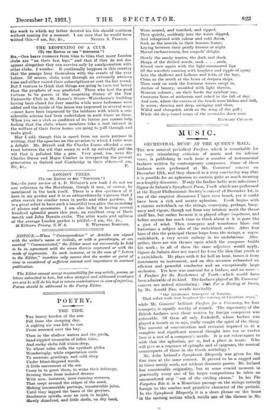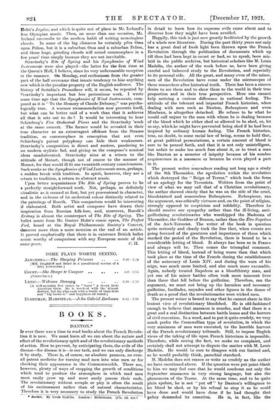MUSIC.
ORCHESTRAL MUSIC AT THE QUEEN'S HALL.
THE new musical periodical Fanfare, which is remarkable for its very stimulating criticism of music and its inferior verse, is publishing in each issue a number of instrumental fanfares written by contemporary composers. Some of these fanfares were performed at Mr. Goossens' concert on December 12th, and they showed in a very convincing way that it is possible for an aphorism to contain quite as much meaning as a lengthy discourse. If only the fanfare habit were infectious ! Signor de Sabata's Symphonic Poem, Youth which was performed at the Royal Philharmonic Society's concert of December 1st, is one of the emptiest discourses I have ever heard, yet it could' have been a rich and meaty aphorism. Youth begins with a riotous switchback on the strings, conveying, perhaps, buoy- ancy and vigour, though not from any intrinsic merit the theme itself has, but rather because it is played allegro impetuoso, and before anyone has much time to think about it it is gone like a gust of wind. Then trumpets and trombones blare out fortissimo a subject also of the switchback order. After four bars of this the principal theme leaps from the strings, a super- switchback, a very scenic railway in its undulations. Alto- gether, there are ten themes upon which the composer builds his work ; to all of them the same adjective would apply. Signor de Sabata does not travel far from the idea that youth is a switchback. • Ho plays with it for half an hour, tosses it from instrument to instrument, and on this occasion exhausted an efficient and powerful conductor and an exceptionally largo orchestra. Yet here was material for a fanfare, and no more— A Fanfare for the Exuberance of Youth—which would have been admirable of its kind. The fanfares played at Mr. Goossens' concert are indeed stimulating : that For a Hosting at Daten, by Mr. Arnold Bax, recalls inevitably
" the intolerant trumpets of honour, That usher with iron laughter fly: coining of Christian arms,"
while Mr. (loosens' brilliant Fanfare for a Ceremony, for four trumpets, is equally worthy of remark. The superiority of the British fanfares over those written by foreign composers was noticeable. Of them all only Prokofieff, whose fanfare was played a month or so ago, really caught the spirit of the thing. The amount of concentration and restraint required to fit a complete and significant musical thought into ten or twelve bars is a test of a composer's mettle. It is not extravagant to wish that the aphorism, per se, had a place in music. Who will give us a sequence of epitaphs and of epigrams, the musical counterparts of those in the Greek anthology ?
Mr. John Ireland's Symphonic Rhapsody was given for the first time at the same concert. It proved to be a rugged and at times untidy work, not without dramatic power. Mr. Ireland has considerable originality, but at some crucial moment in practically every one of his larger compositions he takes an unconsidered step " out of the circling charm." In his The Forgotten Rite it is a Mozartian passage on the strings entirely foreign to the sombre and primitive character of the prelude. In the Symphonic Rhapsody it is a short phrase on the brass in the opening section which recalls one of the themes in Mr; Hoist's Jupiter, and which is quite out of place in Mr. Ireland's less Olympian music. Then, on more than one occasion, Mr. Ireland succumbs to the modern habit of writing meaningless chords. In some of the big climaxes he certainly piles Ossa upon Pelion, but it is a suburban Ossa and a suburban Pelion, and those huge, grinding chords will sound commonplace in a few years' time simply because they are not inevitable. Stravinsky's Rile of Spring and his Symphonies of Wind Instruments were also played—the latter for the first time at the Queen's Hall, I believe, since its very unfavourable reception in the summer. On Monday, real enthusiasm from the greater part of the hall overcame that innate tendency to hiss anything new which is the peculiar property of the English audience. The history of Seriabin's Prometheus will, it seems, be repeated by Stravinsky's important but less pretentious work. I wrote some time ago that the Symphonies of Wind Instruments, com- posed as it is To the Memory of Claude Debussy," was psycho- logically true. A warmer recommendation now presents itself, but what can be better said of a work than that it achieves all that it sets out to do ? It would be interesting to hear Schonberg's Fire Orchestral Pieces and the Stravinsky 'work at the same concert. The former would be revealed in their true character as an . extravagant offshoot from the Strauss tradition, so commonplace in conception that not even Schonberg's patent polyphony can hide their weaknesses. Stravinsky's composition is direct and austere, pandering to no modern stylistic fad, and giving us the composer's musical ideas unadulterated. Stravinsky aims at a return to the attitude of Mozart, though not of course to the manner of Mozart, for that would ill fit our twentieth century consciousness. Such works as the Symphonies of Wind Instruments seem, perhaps, a sudden break with tradition. In spirit, however, they are a return to tradition, a return to abstract music.
Upon better acquaintance The Bite of Spring proves to be a perfectly straightforward work. Not, perhaps, so definitely ritualistic as it seemed at first, but yet processional in character, and in the richness of its orchestral colour distinctly related to the paintings of Roerik. This comparison would be interesting if elaborated. Both artist and composer have drawn their inspiration from Russian folk-lore, and, moreover, Roerik's Ecstasy is almost the counterpart of The Rite of Spring. The ballet music from Mr. Gustav Hoist's comic opera, The Perfect Fool, heard at the Royal Philharmonic Society's Concert, deserves more than a mere mention at the end of an article. It proved emphatically that there is in existence British ballet music worthy of comparison with any European music of the







































 Previous page
Previous page